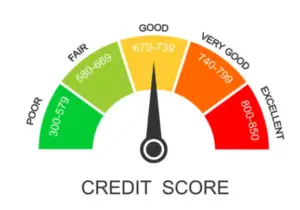The simplest definition of a credit score is a numerical representation of a person’s creditworthiness, based on their credit history and financial behavior. It is through these scores that lenders assess the risks involved in granting a loan, including joint mortgages. This is perhaps the point where you wonder, whose credit score is used on a joint mortgage? Just a simple hint on the topic, in a joint mortgage, it is the credit scores of all the co-borrowers that are typically considered by lenders.
Credit scores often ranged from 300 to 850. The higher the score, the better the creditworthiness while the lower the score, the poorer the creditworthiness. Your chances of being approved for a joint mortgage are increased by a higher credit score. It is best to keep it above 700, or 630 if possible. This is because scores of 720 and above are considered excellent, while scores of 630 to 689 are considered fair. Hence with such figures, it would be easy for you to get a mortgage.

There are several factors that contribute to credit scores. These include but are not limited to payment history, credit usage, length of credit history, types of credit used, and new credit applications.
While thinking about credit scores, it is essential to keep in mind the potential of credit agencies playing with the system. Note that each credit reporting agency uses different algorithms in calculating credit scores. This implies that it is a good idea to monitor your credit reports from all three major bureaus – Equifax, Experian, and TransUnion.
What Lenders Consider when Evaluating Joint Mortgage Applications
Besides credit scores, there are other elements that lenders take into consideration when assessing the risks involved in a joint mortgage application.
Among these factors is your debt-to-income ratio (DTI). This is a ratio that compares your total monthly debt payments, including the potential mortgage payment, to your combined monthly income. In most cases, lenders prefer a lower DTI. This is because it indicates a lower risk of defaulting on the loan. This is generally a DTI of 43% or lower.

Your employment history and stability are other things that are put into consideration. A steady employment history demonstrates financial stability and the ability to make consistent mortgage payments. If you, as an applicant, have a long history of employment and higher incomes, you would be viewed more favorably by lenders.
Another factor that lenders consider is the down payment amount. A larger down payment reduces the loan-to-value ratio (LTV) and decreases the risk that the lender is exposed to. Applicants who have a higher down payment have an advantage in securing a joint mortgage. This is even if their credit scores are not as strong.
Related Post: Will My Bad Credit Affect My Husband Buying a House
Your assets and liabilities, as an applicant, are also considered. Assets, like savings, investments, and property demonstrate your financial stability and a higher ability to repay the loan. On the other hand, having high levels of debt or outstanding loans can negatively impact the evaluation process.
Whose Credit Score Is Used On a Joint Mortgage
A joint mortgage entails multiple people applying for a mortgage together, sharing both the responsibilities and benefits of the loan. Usually, lenders assess the creditworthiness of all co-borrowers to determine the overall risk associated with the mortgage. Basically, this means that on a joint mortgage, the credit scores of all co-borrowers are used.

Traditionally, the lowest credit score between the applicants was relied on by lenders during joint mortgage application evaluation. This is an approach based on the assumption that the weakest credit score acts as a representation of the higher risk involved in granting the loan.
Know What Happens To Your Credit When You Get Married
In recent years, a more holistic approach has been used. Instead of relying on the lowest credit score, lenders are now considering the credit scores of all the applicants and other financial factors to evaluate the overall risk.
Through this approach, the strengths of both applicants are considered, rather than solely focusing on the weakest credit score.
This means if one or any of the applicants has a higher credit score and stronger financials, the lower credit scores of the other applicant(s) are offset.
Options for You as a Joint Mortgage Applicant with Low Credit Scores
In case you and your co-applicant(s) have low credit scores and have a concern about securing a joint mortgage, you can decide to explore these options:
First and foremost, focus on making all your debt payments on time. Payment history is a significant factor in credit score calculations, and consistently paying your bills on time can have a positive impact.
Reduce your credit utilization ratio by paying down existing debts. Aim to keep your credit card balances below 30% of your available credit limit. A lower credit utilization ratio demonstrates responsible credit management and can improve your credit score.
Avoid opening new credit accounts unless necessary. Each new credit application can result in a hard inquiry on your credit report, which can temporarily lower your score. Only apply for new credit when it’s essential, and carefully consider the impact on your credit score.

Regularly check your credit reports for errors or inaccuracies. Mistakes in your credit report can negatively impact your credit score. If you find any errors, dispute them with the credit bureaus to have them corrected.
Consider becoming an authorized user on a credit card with a positive payment history. This allows you to benefit from the primary cardholder’s responsible credit behavior and can help boost your own credit score.
It’s important to remember that improving credit scores takes time and effort. Start early and be patient as you work towards building a strong credit profile for both you and your co-applicant.
Alternatives for joint mortgage applicants with low credit scores
If you and your co-applicant have low credit scores and are concerned about securing a joint mortgage, there are alternatives you can explore.
- Work on improving your credit scores before applying for a joint mortgage. Implement strategies like making debt payments on time, keeping credit balances below 30% of your available credit limit, and avoiding opening new credit accounts, unless necessary. This would gradually raise your credit scores and increase your chances of approval.
- Consider a co-signer or guarantor for the mortgage. A co-signer is an individual with a strong credit history and income who agrees to take responsibility for the loan if the primary applicant defaults. Having a co-signer can provide additional security for the lender and increase the chances of approval.
- Explore government-backed loan programs, such as FHA loans, which often have more lenient credit score requirements. These programs aim to assist borrowers with lower credit scores or limited down payments.
Final Remarks
In a joint mortgage, both your and your spouse’s credit scores are used. This is also the case for any co-borrower. The credit scores of all people associated with the mortgage would be used and keen attention paid to the ones who have the lowest credit scores.
In times of joint mortgages, seek professional advice from mortgage brokers and financial advisors. These are professionals who can provide you with valuable guidance throughout the process and help you make informed decisions.








